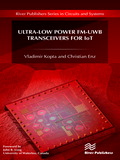Oct 27, 2020
[paper] Optomechanical Sensor in Verilog-A
[book] Ultra-Low Power FM-UWB Transceivers for IoT

[paper] Wearable Circuits for Health Monitoring
†State Key Laboratory of Advanced Welding & Joining, Harbin Institute of Technology, Shenzhen, 518055, People’s Republic of China
‡Flexible Printed Electronics Technology Center, Harbin Institute of Technology, Shenzhen, 518055, People’s Republic of China
§Department of Engineering Science and Mechanics, The Pennsylvania State University, University Park, PA 16802, USA.
#The School of Material Science and Engineering, Harbin Institute of Technology, Shenzhen, 518055, People’s Republic of China
^Advanced Research Institute of Multidisciplinary Science, Beijing Institute of Technology, Beijing 100081, China
ǂDepartment of Materials Science and Engineering, The Pennsylvania State University, University Park, PA 16802, USA.
[Open PhD] IMEC: Modeling of hybrid nanofluidic-nanoelectronic devices for single-molecule biosensing
[Open PhD] IMEC:
Modeling of hybrid nanofluidic-nanoelectronic devices for single-molecule biosensing https://t.co/14Nu8hsWJi #semi pic.twitter.com/bFRejEUYfy
— Wladek Grabinski (@wladek60) October 27, 2020
from Twitter https://twitter.com/wladek60
October 27, 2020 at 09:15AM
via IFTTT
Fwd: IEEE-EDS Santa Clara Valley/San Francisco Chapter October Seminar (Webex only)
Abstract:
In this talk, I will introduce a first-of-its kind quantum-inspired coupled oscillator based compute engine implemented in a standard 65nm technology targeted for NP-hard or NP-complete problems such as max-cut, graph coloring, traveling salesman, and pattern recognition. The NP-hard problem is first mapped to the coupling weights while the solution is represented by the phases of the individual oscillators, which are read out using on-chip phase sampling circuits. Our hardware exploits the natural tendency of a network of coupled oscillator to settle to the ground state, which offers significant performance and power advantages compared to traditional digital approaches.
Speaker Bio:
Chris H. Kim received his B.S. and M.S. degrees from Seoul National University and a Ph.D. degree from Purdue University. He is currently a professor at the University of Minnesota. Prof. Kim is the recipient of the University of Minnesota Taylor Award for Distinguished Research, SRC Technical Excellence Award, Council of Graduate Students Outstanding Faculty Award, NSF CAREER Award, Mcknight Foundation Land-Grant Professorship, 3M Non-Tenured Faculty Award, DAC/ISSCC Student Design Contest Award, IBM Faculty Partnership Award, IEEE Circuits and Systems Society Outstanding Young Author Award, the ICCAD Ten Year Retrospective Most Influential Paper Award, ISLPED Low Power Design Contest Award (4 times), and ISLPED Best Paper Award (2 times). His group has expertise in digital, mixed-signal, and memory IC design, with special emphasis on circuit reliability, hardware security, memory circuits, radiation effects, time-based circuits, beyond-CMOS technologies, and machine learning hardware design. He is an IEEE fellow.
Subscribe or Invite your friends to sign up for our mailing list and get to hear about exciting electron-device relevant talks. We promise no spam and try to minimize email. http://site.ieee.org/scv-eds/subscribe/



